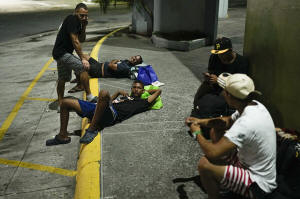Panama to allow 112 migrants deported from the US to move about freely
in the country
[March 08, 2025]
By ALMA SOLÍS and MEGAN JANETSKY
PANAMA CITY (AP) — Panama announced Friday that it will allow 112
migrants deported from the United States who have been held in a remote
camp in the Darien region since last month to move about the country
freely until they decide on their next course of action.
The government cited humanitarian reasons for the decision but rights
lawyers promptly expressed concerns that this could be a tactic to
absolve the authorities of international scrutiny for their treatment of
migrants while also putting them in more danger.
Panama’s Security Minister Frank Ábrego said the migrants — from a
number of mostly Asian nations — would be granted temporary humanitarian
passes as documents. They would find their own places to stay while they
decide where they are going next, Ábrego said, without elaborating.
The passes would last for an initial 30 days but could be renewed, he
added.
“They have exactly 30 days to figure out how to leave Panama, because
they refused ... to accept help from the (International Organization for
Migration) and (the U.N. Refugee Agency) and said that they wanted to do
it themselves,” Ábrego said, speaking to reporters outside a security
conference Friday.
“Panama has decided to respect this,” he also said.
Panama has come under pressure from human rights groups for holding the
migrants without their passports or cell phones in harsh conditions.
Lawyers had petitioned the Inter-American Commission on Human Rights on
their behalf.

Most of the migrants had been moved to the camp in San Vicente on Feb.
19, from a hotel in Panama City where they had initially been held under
police guard. Migrants who agreed to voluntarily return to their
countries remained at the hotel and those who didn’t were sent to the
camp in the Darien.
Álvaro Botero, one of the lawyers who filed the petition, said his legal
team was concerned the humanitarian permits are a way for Panamanian
authorities to wash their hands of the deportees, many who fear for
their safety in their own countries.
“Many of these people have legitimate claims to seek and receive
asylum,” Botero’s said. “The option of deporting them is not the
protection that these people deserve."
While deportees were stripped of their phones by Panamanian authorities,
a handful of people, including one who has spoken with The Associated
Press, have been able to communicate secretly with hidden phones.
Botero's team was informed by one of the migrants in the camp that they
were given papers to sign for the 30-day permit. Signing the document
apparently implied the migrants would accept the 30-day permit on the
condition that they leave Panama after that period of time.
[to top of second column]
|

Venezuelan migrants returning from southern Mexico after giving up
on reaching the U.S. rest on the street in Panama City, Thursday,
March 6, 2025. (AP Photo/Matias Delacroix)

Botero's team asked the client not to sign the document because the
lawyers were unable to look into the text.
He also warned the permits may be an attempt by authorities to
influence the outcome of the human rights petition next week.
“They want to report, ‘You know what, we already granted
humanitarian permits to the people that were detained and they are
no longer detained,'” he said.
The camp had originally been established for the hundreds of
thousands of migrants crossing the treacherous Darien Gap between
Colombia and Panama in recent years as they made their way toward
the U.S. border.
President Donald Trump's shutting down of access to asylum and other
legal routes at the U.S. southern border in January forced many
migrants already in transit to reconsider their options. Panama and
Costa Rica have reported seeing a reverse flow of migration as
migrants began moving south.
The U.S. had sent 299 migrants to Panama as the Trump administration
tried to accelerate deportations as part of a deal in which
countries like Panama and Costa Rica act as “bridges,” temporarily
detaining deportees while they await return to their countries of
origin or third countries.
Some of the migrants held in the hotel had held up handmade signs in
their windows, asking for help.
At the camp, a migrant who had a hidden cell phone told an AP
reporter they were sweltering, fighting ants and receiving no
information about what would happen with them next.
Panamanian authorities have not responded to requests for comment
about the conditions and have denied journalists access to the
camps.
The migrant, who requested anonymity fearing for her safety, said
last week that a small riot broke out because guards blocked a
migrant from accessing their phone, information that was verified by
lawyers speaking to another individual inside the camp. Authorities
sent armed guards to suppress the riot, she said, and another
migrant in the camp went on a days-long hunger strike.
“We are treated like prisoners here,” she said.
___
Janetsky reported from Mexico City.
All contents © copyright 2025 Associated Press. All rights reserved |